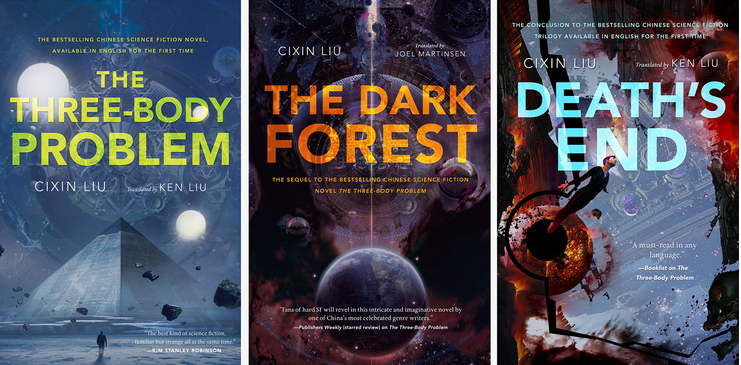
The majority of the SF I have read recently has had a common theme: the acceptance of otherness. This trilogy, however, is quite different. The Three-Body Problem, The Dark Forest, and Death’s End, by Cixin Liu, are much more than a single theme, but, at their heart, they explore the idea that the universe, if intelligent life is common within it, might be characterised by a nihilistic Darwinian savagery, in which species seek to eradicate any other worlds which promise to rise to a level of technology which might challenge theirs. On Earth, a division between idealists and hard-nosed Machiavellians leads to a disastrous transmission of our existence to the hostile galaxy, and the planet becomes a target for a malevolent and desperate alien invasion force.
This is hard SF, in the sense that it tries to create an entirely plausible scientific framework for its extrapolations about the future. Intelligence, even down to the level of an ant tracing out the carving in a headstone, is treated as a set of theories, rooted in mathematical and physical laws. Some of its conclusions, as they crop up through the vast plot, are stunning, and I don’t want to spoil the enjoyment of discovery for readers who have not yet read them, but they are not what most moved me about, at least, the first two novels of the trilogy.
Rather, this series begins in, and seems to expand upon, recent Chinese history, finding in the brutal, perverted logic of the Cultural Revolution a pattern of human behaviour that undermines the hope that humanity might ever advance its condition through the application of science and logic. Neither does it seem to offer a solution: idealism, love, asceticism and devotion to duty all serve within its epic progress to cause further destruction, greater confusion. The result of all this savagery is an unravelling, not merely of the world, but of the universe. Despite the beauty of Ken Liu’s translated prose, this is a profoundly pessimistic series of books.
The lasting impression I took from them was of a wild, overgrown, ravaged city; life rampant and uncaring, and the whole of human invention and creativity just a miniscule rash hidden within one of its minor folds. They are beautiful, they are immense, and they are terribly, terribly cold.
Leave a Reply
You must be logged in to post a comment.